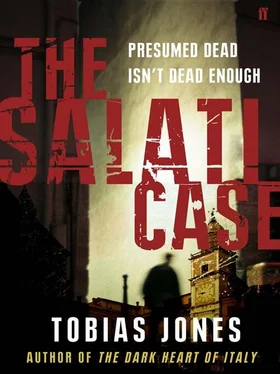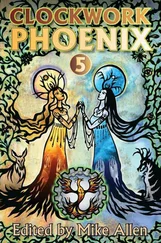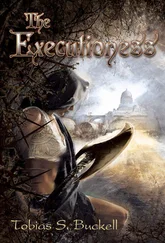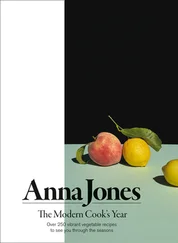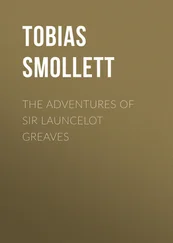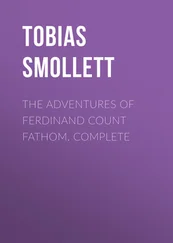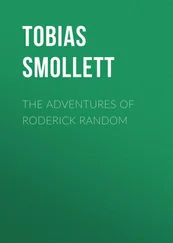That meant that soon enough the press would start to listen to Teresa Tonin’s side of the story. The pendulum of public opinion would swing behind the poor mother. She would hire a lawyer, maybe even her husband, to insabbiare . It happened all the time around these parts. Contradictory evidence would turn up in unexpected places. Investigating magistrates were dropped from a case because of some stitch-up. Whispering campaigns cast enough doubts to make even a hot gun unreliable. The obvious got silted up with the decoy, until the decoy became the story and the obvious walked free. That’s what Italian justice is all about.
It was the middle of the night and I was just about to walk out the back door when I caught a glimpse of the gardener’s widow. She was sitting in a chair with a female officer next to her. She was still shaking and staring into space.
I walked up to them. The widow looked at me like she still believed I had pulled the trigger.
‘Excuse me,’ I said. The female officer straightened up. ‘Could I ask something?’
They both just looked at me.
‘How long had your husband worked for the Tonins?’
‘Thirty years.’
‘That right?’
She nodded.
‘Did you resent the time your husband spent at Tonin’s house?’
‘What’s that supposed to mean?’
‘Do you think he went beyond the call of duty?’
She held my stare. ‘He was always on duty. That’s what it’s like when you’re domestics. You live on the job. We’ve lived in their grounds all our married life. And now, when they find themselves in trouble, it’s Giulio who dies.’
I nodded slowly, trying to show her that I shared her indignation. ‘Where was your husband from?’ I asked.
‘His family were all from near Borgotaro.’
‘Up in the hills?’
‘Sure. His mother owned a small farm up there.’
‘What about his father?’
‘Died in the war.’
‘Where’s the farm exactly?’
‘What’s it to you?’ She said it without malice.
‘Where is it?’ I repeated.
‘Just beyond the bridge on the left. He sold it when his mother died.’
‘When?’
‘A few years ago.’
‘What was it called?’
‘Il Mulino.’
I looked at her. She replied so absent-mindedly that she must have thought I was just passing the time of night. She hadn’t put anything together yet, had no idea quite who her husband had been.
Dall’Aglio was still at his desk at 4 a.m. That’s what I liked about him. He worked my hours. I knew what I needed but he wouldn’t like it.
‘Listen,’ I said to him as he finally put down the receiver, ‘there’s been a lot of blood spilt. Two lives lost, maybe three. I still need to resolve the Riccardo Salati case and I’m going to ask you something unusual. I need a dozen men.’
He laughed.
‘Your chance to be a hero,’ I said.
‘Why do I get the impression that’s a role you want for yourself?’
‘That’s bull. Nothing I want less, I assure you. I’m not the one with medals.’
He patted his chest and looked at me with a smile. He liked the idea of being a hero. There aren’t many people who don’t. He wanted to walk halfway down those front steps and tell the doubting media that he had an incredible story from fourteen years ago that all his predecessors had failed to crack.
‘When?’ He looked at me with resignation.
‘Tomorrow morning.’
‘It’s morning already.’
He agreed in the end. He took more convincing than a nun in a nightclub, but eventually he sighed and said OK. He said the order would go out as soon as the new shift came on at 8 a.m.
I walked home exhausted. I sat in the flat trying to think things through, but I was too tired. The flat was a mess and I couldn’t even cook something to eat because the pans were full of dried beeswax and oil. A week’s worth of washing-up was balanced in the sink like a cartoon, two columns rising to shoulder height.
I must have been thinking about my bees, because I suddenly realised that families in Italy are just like hives. It’s where the woman rules. She rules because she’s a mother, and she never retires. She fights for her children until the death, and – in Silvia Salati’s case – beyond it.
I slept until mid-morning. When I finally got out of bed I saw something I hadn’t seen for weeks. The sun was out and the sky was a dark blue. It was as if the thick, cloying fog of winter had opened up and decided to allow us one blissful reminder of what it would be like when the spring really arrived. Out of my window I could see the cupolas of the city skyline looking plump and august. It felt like I had rediscovered old friends.
After breakfast I got in the car and drove through the city. It was unrecognisable. People were sitting out and taking their coffees in the bright cold. Instead of selling umbrellas to damp pedestrians, immigrants were now selling sunglasses and pirate CDs on flat cardboard. Cigarette smoke spiralled in the sun. The trattorie , which had been eerily quiet all week, now sounded their atonal percussion of cutlery and cork-screws as they got ready for the Sunday trade. The bellowing joviality was back in full swing.
I drove out to Borgotaro. It didn’t take long.
The day seemed even more magnificent up there. People were walking around the bars. Most were wearing dark glasses. You could see the mountains, their peaks only a little higher than where you were standing, their snow glistening like fior di latte .
The pasticcerie were doing a roaring trade, piling dozens of bite-size puffs on to rectangular trays. I looked around the place and saw fur and ribbons and the glint of wine glasses being refilled. It felt like the typical, affluent Sunday morning in the sun. People were even buying ice-cream. Polystyrene baths were being filled with seedy crimson sorbets and pale, shiny creams.
I found Il Mulino easily enough. The farmer and his wife were standing around. They looked horrified at the number of uniforms crawling all over their land. I watched the cadets with their trowels. They were lined up like toy soldiers and worked north to south, then east to west, micro-ploughing the soil.
The mess, the farmer must have known, would be nothing compared to the publicity. He might already have an idea what they were looking for. The carabinieri don’t normally plough your field to sow corn, he knew that. He could see the value of his land collapsing before his eyes. Human remains don’t normally add much to the value of your pasture.
I spoke to the commanding officer, one of the uniforms who used to make Dall’Aglio’s coffee only a year ago. He was so young I couldn’t help being condescending.
‘Ask the locals about any caves, ravines, rivers, wells, woods.’
‘I know what I’m doing,’ he said, defensively.
‘Ask about any place old Bocchialini might have known, places he used to go to. Clubs he used to belong to.’
He shouted something to one of his men to make sure that I knew he wasn’t listening any more.
‘Who have you interviewed?’ I asked.
He didn’t say anything, which I took to mean he hadn’t spoken to anyone. I walked away, heading towards the farmhouse where I could see the farmer with his hands on his hips.
The officer called me back. ‘This is being treated as a crime scene,’ he shouted.
‘No entry?’
‘None.’
I walked back towards him and tried to keep calm. ‘I’m practically in charge of this investigation. I wouldn’t say Dall’Aglio’s taking orders from me, but he’s taking advice, you with me?’
The man looked at me like I had urinated on his shoes.
I set off towards the farmer again and the officer ignored me.
Читать дальше
